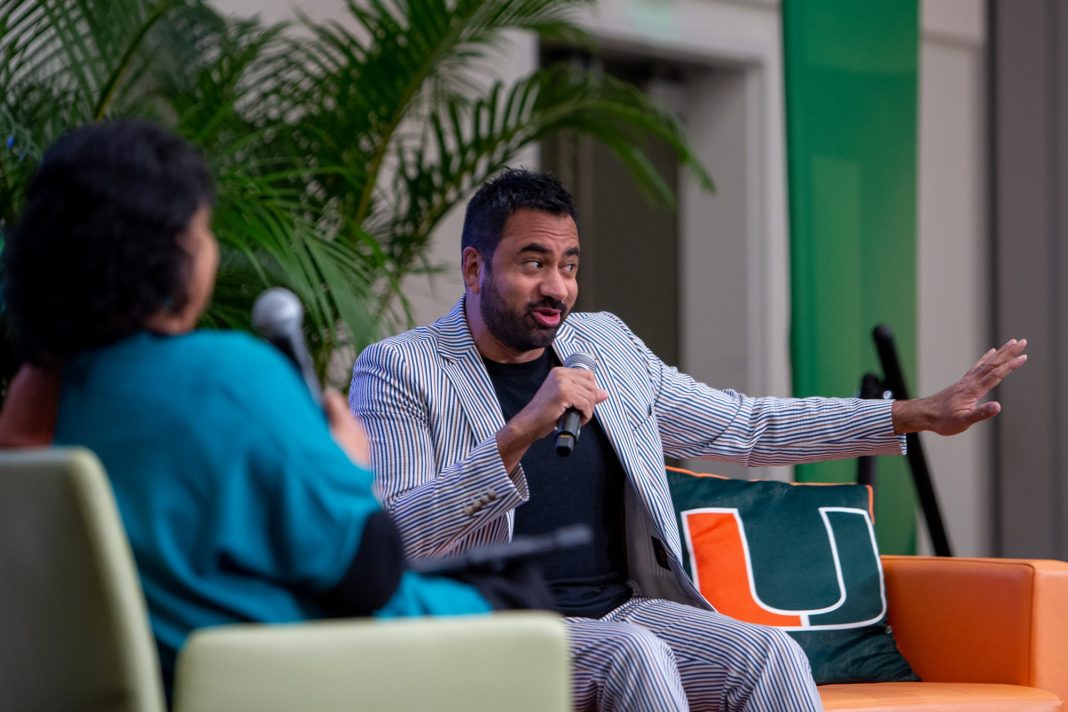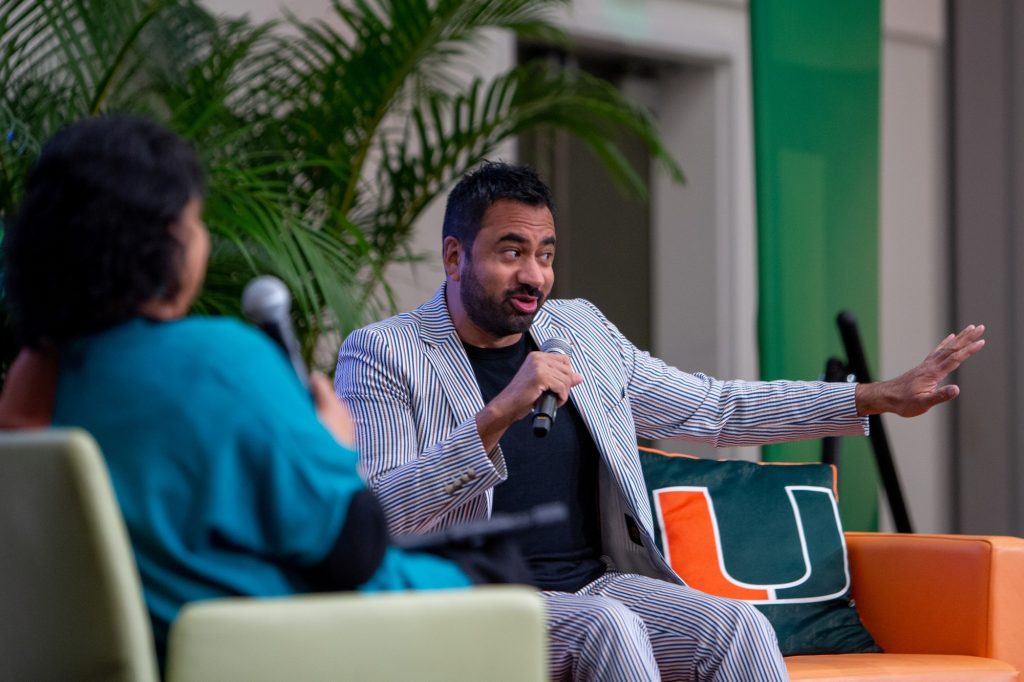

On Thursday, the University of Miami’s What Matters to U (WMTU) hosted a conversation with actor, comedian, writer and former White House staff member, Kal Penn. During his hour-long conversation, between comedic anecdotes and friendly banter, Penn discussed his acting career, his time in the Obama administration and the importance of diversity and representation in the media.
In 2000, fresh out of the University of California Los Angeles’ film school, Penn–who at the time still went by his birth name Kalpen Suresh Modi–dove head first into his acting career. The young comedian bounced between auditions and took on odd jobs with the hopes of climbing Hollywood’s star-studded ladder. However, as a first-generation Indian-American, Penn would find himself faced with a plethora of hurdles.
“The barriers to entry were very-very high when I was growing up,” Penn said in an interview with The Miami Hurricane.
In the face of Hollywood’s adversity, Penn did not waiver. He took on his stage name, Kal Penn, and pursued roles that he felt opposed, or at least limited, Indian stereotypes. Penn recalled his audition for late 90’s hit show, Sabrina the Teenage Witch, in which he was asked to read his audition piece with a fabricated Indian accent.
In a separate audition, for a role alongside Ryan Reynolds in the 2002 film Van Wilder, Penn recounted being up against a Caucasian actor in brown-face for the role of Taj Mahal, a foreign exchange student from India.
Upon hearing the name of the character for which he was auditioning, Penn refused the role. However, after reading the script in full and internal-debate over the value of the character, Penn decided to audition for, and eventually play, Taj Mahal. However, this was not before Penn spoke with the writers and director about making changes to the script to limit harmful stereotypes and improve the authenticity of the character.
“That was the first time I felt a sense of agency,” Penn said.
From there Penn went on to star in numerous films and TV shows including House, Designated Survivor, The Namesake and The Harold & Kumar franchise.
“He was that person for me when I was younger and didn’t see myself on screen at all,” said Geethika Kataru, the student moderator for the WMTU event. “He was the person that was there, whose face on things and he was playing this character in Harold & Kumar that was not at all the stereotype that American-Indians usually are and it was so great having that representation, so it felt like I was talking to one of my heroes”
Penn has made representation in the film’s and shows he works on a top-priority. Penn said that diversity in the writers room, in the cast and in all facets of media is “not just the right thing to do, it gives you better comedy.”
Kataru said this notion of self-advocacy and value in diversity spoke to her after seeing so much of Penn’s career reflected in her own.
“One thing that he said that particularly resonated with me was the struggle of trying to be a brown person in a creative field. As a film major that’s something that has really been on my mind and what that’s going to mean for me post-grad. So, again, I feel that that self-advocacy bit is something that I know I’m going to take away from it and just knowing that I can stand my own ground and put in my two cents when something feels wrong,” Kataru said. “You can always make it a safer place for yourself.”
Penn first fell in love with comedy in middle school, a time in which he confesses he wasn’t everyone’s definition of “cool.”
“Realizing you can subvert people’s expectations through humor a lot of times,” Penn said. “I don’t think that I recognized that that’s what it was when I was thirteen, but I did realize there was some magic that I enjoyed about comedy and storytelling and so that’s what drew me to it.”
This magic would carry him through Hollywood, around the globe and in 2009 all the way to the White House with the Barack Obama administration.
Penn, playing Dr. Lawrence Kutner in the hit series House at the time, was offered a position in the Obama administration as the associate director of the White House Office of Public Engagement and Intergovernmental Affairs. Penn would go on to accept the position and serve in the White House until 2013, taking a short hiatus from the post in 2010 to film A Very Harold & Kumar 3D Christmas.
During his time in the Obama Administration, Penn worked on a range of initiatives such as doubling the funding for the Pell Grant, repealing the “Don’t Ask, Don’t Tell” policy, the Affordable Care Act and the DREAM Act.
Penn first got involved in the Obama administration when his House colleague, Olivia Wilde, invited him to a campaign event for the then junior senator, Obama. Penn said he had no intention of going into politics, but found himself surrounded by individuals passionate about doing what they felt was ‘right’ and from there became deeply involved in the campaign and eventually the administration.
“I met a lot of people working long hours and sleeping on couches for things they believe in,” Penn said. “None of it was planned. It was just a sort of roundabout way of getting there.”
This strong belief in holding onto one’s values stems from his grandparent’s involvement in the Indian independence movement. Penn recalled his grandfather sharing these stories with him as a young boy.
“He had a scar on his leg that he showed me once and I was just so floored that he’d been thrown in jail for standing up for his human rights,” Penn said. “That was never presented as politics in our house, it was always presented as doing the right thing and remembering where you came from and making sure you pay it forward. So, I had never conceived any of this as political.”
Penn’s career is shaped by this notion of progress and “doing the right thing.” Whether that be in his efforts to make Hollywood more representative of the American people, character’s more authentic or policies more just.
“What do we do to make it better,” Penn asked. “For now, I’m really happy making dumb jokes on TV.”






